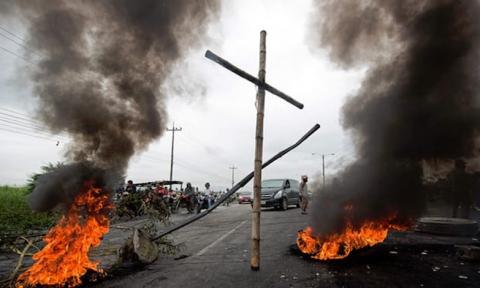Honduran police have announced they will refuse to obey orders from the government of the incumbent president, Juan Orlando Hernández, and will remain in their barracks until a political crisis triggered by last Sunday’s contested presidential election has been resolved.
All national police – including elite US-trained units – in the capital, Tegucigalpa, would refuse to enforce a curfew ordered by the government after days of deadly violence triggered by allegations of electoral fraud, a spokesman said on Monday night.
“We want peace, and we will not follow government orders – we’re tired of this,” said the spokesman outside the national police headquarters.
“We aren’t with a political ideology. We can’t keep confronting people, and we don’t want to repress and violate the rights of the Honduran people.”
Crowds of anti-government protesters greeted the announcement with cheers and chanted: “The people united will never be defeated!”
Earlier a member of the Cobras anti-riot squad said: “This is not a strike, this not about salaries or money. It’s that we have family. We are tired. And our job is to give peace and security to the Honduran people, not repress them. We want all Hondurans to be safe.”
The announcement marked a dramatic twist in a week-long electoral debacle that has plunged the volatile country into its worst political crisis since a coup in 2009.
It came shortly after international observers called for Honduran voting authorities to carry out a recount, and the opposition candidate Salvador Nasralla again claimed victory in the election.
“I am the president-elect of Honduras, the president chosen by the people,” said Nasralla, who had a five-point lead when nearly 58% of the votes were counted in the first hours after the 26 November election. The count then slowed dramatically and his lead gradually disappeared as results dribbled out, leading the opposition to claim the election was being stolen by President Hernández.
Jorge Quiroga, the head of an Organisation of American States mission to Honduras said the OAS mission called for the recount, saying that irregularities, errors and systematic problems meant that they could not be certain of the result.
Early on Monday the government-controlled electoral commission found that Hernández was ahead of Nasralla, by 42.98% to 41.39%, after a recount of suspicious votes from just over 1,000 polling stations.
But the Supreme Electoral Commission, known as the TSE, refrained from declaring a winner and hinted that a wider recount could still be possible.
The string of irregularities has fuelled growing frustrations that have boiled over on to the streets and caused many people, including international observers, to question the legitimacy of TSE’s results.
Since Sunday, Hondurans have taken to the streets across the country, facing off against security forces clad in riot gear, who used teargas and water cannon. A night-time curfew imposed on Friday has curbed protests but not put an end to the violence.
A number of international journalists have been detained by security services including Jihan Hafiz who said she was being deported along with fellow reporters Ed Augustin and Reed Lindsay.
As negotiations continued on Monday, Nasralla’s Alliance party repeated calls for a recount of results from more than 5,000 polling stations that were tabulated after an alleged glitch in the TSE’s vote-counting system on Tuesday – and ultimately reversed a trend that indicated he would be the winner. Protestors accuse Hernández of manipulating votes and “stealing” the election.
“We a going to demand they review the votes from 5,179 stations. If not, we will protest,” spokesperson Rodolfo Pastor wrote to the Guardian.
On Monday the Inter-American Commission on Human Rights reported that they had received preliminary information on the deaths of 11 Hondurans during the protests that have gripped the streets since the election crisis began.
“We condemn all forms of repression regret all the deaths. In a democracy it’s normal that people have the right to peacefully protest,” said Marisa Matías, head of the EU mission. The United States’ top official, Heide Fulton, congratulated the TSE for the “orderly count” of votes it conducted on Sunday night.
Hernández is a close ally of the United States and his government has closely cooperated with Washington on border security, counternarcotics operations and migration policy.
On Monday, Reuters reported that the US state department had certified that Honduras had been supporting human rights and fighting corruption. The certification would allow the Hernández government to receive millions in US security assistance. In 2017 the US provided $17.3m in security assistance to Honduras.


Spread the word